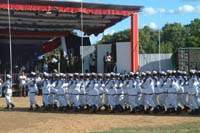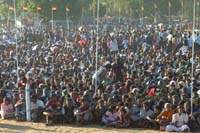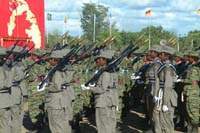 |
|||||||
|
How
will Bala come to the Wanni?
That was after
news reached Colombo that the man for whom high security measures
were planned for will not come after all. Dr Anton Balasingham,
Chief Negotiator of the Liberation Tigers of Tamil Eelam (LTTE),
was to have left London on last Wednesday to arrive in Colombo on
Thursday afternoon. Soon after his flight touched down at the BIA,
he was to be whisked away to Wanni in a Sri Lanka Air Force helicopter. Norway's Ambassador
to Sri Lanka, Jon Westborg, The Sunday Times learnt,
conveyed to United National Front Government leaders of plans by
Dr Balasingham to fly to Colombo and later to Wanni. Last Tuesday
night, UNF leaders led by Defence Minister, Tilak Marapana, hurriedly
set in motion plans to ensure tightest security measures were in
place. However, Norwegian facilitators made it known hours later
that he will not come. The official
reason attributed for Dr. Balasingham and his wife Adele Anne's
non arrival, The Sunday Times learnt, was due to confusion
over airline tickets. The Norwegian Government is said to have arranged
for the tickets from Oslo but instead of reaching London, it had
by mistake, gone to Frankfurt. However, Dr.
Balasingham's refusal to take a subsequent flight has raised doubts
on whether there were other reasons. Whether it had any relevance
to Wednesday's mob attack on the Police Special Task Force (STF)
camp at Kanjirankudah, near Pottuvil, had any bearing is not clear.
Intelligence
sources believe LTTE leader, Velupillai Prabhakaran, was all along
opposed to Dr. Balasinghams arriving in the Wanni through Colombo
due to security considerations. They say it was Mr Prabhakaran's
objections that made Dr. Balasingham arrive in Wanni, in April,
this year, from the neighbouring Maldivian capital of Male, in a
seaplane operated for tourist purposes in the archipelago by a Scandinavian
company. He took the same route during the return journey but the
seaplane was the subject of a controversy after its pilot reportedly
swooped low, at least twice, over a Naval cordon that had surrounded
a Sea Tiger flotilla in Trincomalee. The flotilla was headed towards
a Sea Tiger base near Batticaloa (Situation
Report - May 12) Worries of any incident involving a seaplane
affecting the Maldivian tourist industry had prompted its owners
to refuse to hire their fleet. Since the first
round of peace talks, Norwegian facilitators have been using their
good offices to persuade the Government of India to allow Dr. Balasingham
to fly to the Wanni from the Southern Indian state of Kerala. This
is whilst the LTTE leaders used their own channels to win the support
of Indian Defence Minister, George Fernandez, with whom they had
cultivated a long standing relationship, years before he became
a Cabinet Minister. The Sunday
Times learnt plans had been afoot for Dr. Balasingham and
an entourage to fly from Trivandrum to Kilinochchi in a helicopter
hired from a private company. However, news of the reluctance of
the Government of India to allow Dr Balasingham had come only late
last week. According to diplomatic sources in Colombo, Indian authorities
are learnt to have explained to Norwegian facilitators the reasons
for their inability to allow the request. The political
fall out of such a move is said to worry the Indian Government particularly
since the LTTE remains banned in India. This is more so in view
of the prevailing anti-LTTE feeling not only in Kerala but also
in the adjoining state of Tamil Nadu. The state of Kerala is under
the control of the opposition Congress Party. In the state of Tamil
Nadu, where the AIDMK (Anna Dravida Munnetra Kazhakam) is in power,
its Chief Minister, Jeyaram Jeyalalitha, recently ordered the arrest
of an opposition leader, Vaiko Gopalaswamy, head of the MDMK (Marumalartchi
Dravida Munnetra Kazhakam), for a supporting the LTTE, a banned
organisation. He is still being held in custody. For both Dr.
Balasingham and the LTTE, winning the Indian Government's approval
for a stop over in Trivandrum, en route to the Wanni, would have
meant a significant political victory. That too, in the backdrop
of the Government of Sri Lanka lifting the four year proscription
on the LTTE, ahead of the Sattahip peace talks in September. Such
a move would have strengthened their case for a plea to other countries
that have banned them to withdraw such measures. Now that the
proposed passages via Maldives, India and Colombo have been ruled
out, how will Dr Balasingham arrive in the Wanni remains the biggest
question. Even the possibility of Colombo being re-considered is
not ruled out. This is because Norwegian Deputy Foreign Minister,
Vidar Helgesson, is due in London anytime now from Oslo for talks
with Dr. Balasingham about his visit to Wanni and related matters. Dr Balasingham
was expected in Wanni for the October 10 Tamil Women's Day which
commemorates the death of the first LTTE female cadre, Malathie.
She died in a confrontation with Indian troops on October 10, 1987. Dr Balasingham's
presence in the Wanni for meetings with his leader, Velupillai Prabhakaran,
has become imperative in view of the upcoming second round of peace
talks. These talks have been extended for a fourth day, from October
31 to November 4, in view of the participation of the LTTE Political
Wing leader, S.P. Tamilselvan and others. They are to make speeches
in Tamil. The services of qualified professionals are to be obtained
to translate their speeches into English. A day's extension is because
of the time taken by such a process and the responses it will receive
from the Government side. Besides discussing
issues that will come up during the second round of talks, Dr Balasingham,
according to sources in Wanni, is also to discuss with Mr Prabhakaran
current developments in the east triggered off by Wednesday night's
mob attack on the STF camp at Kanjirankudah. Although the LTTE has
officially stayed clear of the string of incidents, including those
in Trincomalee, the sources say, the LTTE wants to raise issue over
what it calls severe hardships to Tamil civilians in the East. Such a move
may lead to calls for further de-escalation of security measures
through various means - a growing nightmare for Security Forces
top brass who privately complain of the already increasing "security
vacuum" in the North and East. Their apprehensions have heightened
further in the backdrop of the proposed Joint Task Force comprising
personnel of the Security Forces and Tiger guerrillas, to be appointed
shortly, to examine the question of re-settling residents who were
rendered homeless after a sprawling High Security Zone was created
around the Security Forces Headquarters in Palaly at the height
of the separatist war. According to
Dr. Balasingham, more than 70,000 persons from over 20 villages
are waiting to return to their homesteads. Since re-settlement and
rehabilitation have become subjects of high priority, a programme
for their return would have to be formulated by the Joint Task Force
and executed immediately. Troops have already vacated schools, places
of worship and public buildings. The re-settlement programme will
naturally lead to further re-location of troop positions and thus
a restriction of areas coming under their control. Despite assertions
to the contrary by UNF leaders, who are eager to ensure the peace
process is on track at any cost, the widening security vacuum, not
to mention other security concerns, have not been fully examined
with Security Forces top brass. A cross section of senior officers
The Sunday Times spoke to not only reflected this
view but also emphasised that the focus now was on fully downsizing
the military. A common complaint was that none of the issues have
been discussed with them or examined in detail. They were quick
to assert that their concerns were in no way an opposition to the
peace process but only underscored the scant, and often cynical
attention paid by those responsible for the security establishment
in the UNF hierarchy to national security issues. That is both during
a peace scenario or when national security threats arise from developing
situations, like for example, the current developments in the east. The UNF has
already embarked on a priority programme to find assignments for
troops, particularly the Army, in United Nations Peace Keeping missions.
A retired British Army officer, Sir Gen. Michael Rose, has been
commissioned to prepare a report on how to train the troops for
this purpose and how to find placements. Sir Gen. Rose, who was
in Colombo, last month is due here again in the coming weeks. Some irritants
in the Government-LTTE relationship, caused by the guerrillas taking
hostage of seven soldiers, (one was released on humanitarian grounds),
in retaliation over a separate incident where two armed guerrillas
were arrested and remanded for felling trees in a forest reserve,
was resolved on Wednesday. A Magistrate in Trincomalee granted bail
for the two guerrillas following an order from the Appeal Court.
The same evening, six soldiers were released to the ICRC in Kumburupiddy,
north of Trincomalee. As the men
returned to their camp at Monkey Bridge for a debrief, another incident,
with potentially dangerous implications, was unfolding in the Amparai
district. On Wednesday night, a mob attacked the Police Special
Task Force base in Kanjirankudah, near Pottuvil. Seven persons were
killed and more than 25 have been injured. The sequel
was protest campaigns in other towns in the east which later spread
to the north. On Friday, life in Trincomalee came to a standstill.
The deaths of four civilians in two separate incidents prompted
a curfew in the district. These events came hard on the heels of
a hartal just days earlier that paralysed life. It was held to demand
the release of the six soldiers the LTTE was holding hostage. Needless
to say these incidents upset tour operators in Colombo. Some found
their clients, who were held up when they were travelling to Trincomalee,
board the first available flight out of Sri Lanka to return home.
The flow of domestic tourists, who thronged this northeastern City,
also slowed down. Nowhere was
the concern over developments in Trincomalee more reflected than
at Janadipathi Mandiraya. Disappointed that President Kumaratunga,
the Commander-in-Chief was not receiving Incident Reports, aides
kept calling senior military and intelligence officials to ascertain
what was going on. The fact that no proper feedback was being received
was underscored by an official announcement from the Presidential
Secretariat on Friday night. It said: "The
President is deeply concerned at the deteriorating security situation
in Trincomalee. The President has set up a special monitoring unit
at the President's House manned by Army and Police personnel. "This
unit began operations at 1700 hours (5pm) today (11th October) and
will function round the clock and keep the President updated of
the security situation in Trincomalee and its environs. "The
public may contact this unit with information on the following telephone
numbers 433215 and 321201." This announcement,
surprisingly enough, is just a day after the UNF leaders renewed
their efforts at co-habitation. Prime Minister, Ranil Wickremesinghe
accompanied by Ministers Milinda Moragoda and Tilak Marapana met
President Kumaratunga on Thursday to talk of what was termed "a
process of discussion on the issues involved in the ongoing negotiations
between the Government and the LTTE." Associated with President
Kumaratunga was former Foreign Minister and now International Affairs
Advisor to the President, Lakshman Kadirgamar. An official
announcement said "it was agreed that joint meetings would
be held at regular intervals…" It is no secret that Thursday's
round of talks to renew efforts at co-habitation came amidst reports
that the UNF, after all, will not be able to muster required numbers
for the passage of the 19th Amendment to the Constitution. Consequently
the implementation of the hurriedly formulated defence reforms,
which also require Constitutional amendments, will remain on hold. However, the
Committee tasked for formulating these reforms continues its work
despite complaints from many in the security establishment that
it lacked transparency. General (retd.)
Hamilton Wanasinghe, a former Army Commander, who has personally
seen action during the separatist war and conducted many an offensive
operation, told The Sunday Times he refused to testify
before the Committee since only one member, Lt. Gen. (retd.) Denis
Perera wanted to hear his representations. Gen. (retd.)
Wanasinghe, who also served as Defence Secretary under a United
National Party Government said the Secretary to the Committee had
telephoned him and asked him to appear. "They were in a mighty
hurry. I was told that the two civilian members were away and only
one member would sit. I explained there was no point in my making
representations to one person when the Committee was made up of
three," he said. Gen. (retd.) Wanasinghe said he had later explained to one of the Committee members, Treasury Secretary, Charitha Ratwatte, the reasons why he could not testify. Interesting enough, Gen. (retd) Wanasinghe was not given an opportunity to appear before the Committee (with the three members sitting) even at a later date. Last Thursday,
a crowd of nearly 40,000 thronged a venue in Wanni where the LTTE
put up a show of strength by parading its armed female cadres to
mark the Tamil Women's Day. The Sea Tiger "Commander"
Soosai was the Chief Guest. What he told
the gathering is reported in the Tamilnet, the website that reports
accurately on LTTE matters. This is what he said: "Our
armed forces have fought for achieving our homeland, respect for
our nationality and self-rule. It is important that we continue
to modernise and strengthen our armed forces until we achieve our
goals. "You
may ask us why we should hold military parades like what you saw
today in this atmosphere of peace. It is the strength of our armed
forces that have helped to achieve the peace that all are enjoying
now. "Sinhala
people must understand that our armed forces are only for protecting
our own people. They are not meant to conquer other or take other
people's territories. Our armed forces are not a threat to anyone." That speaks of the LTTE's priorities. Soosai makes no secret that the Tiger guerrillas have to "modernise and strengthen our armed forces until we achieve our goals." What of the UNF Government ? It has embarked on programmes to train troops for peace-keeping operations in other parts of the world. Like the defence reforms, the priorities seem to be misplaced. Or, are there any priorities at all? |
|||||||
Copyright © 2001 Wijeya Newspapers
Ltd. All rights reserved. |
|||||||


